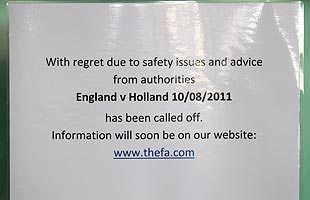The wave of riots and public disorder sweeping the United Kingdom has prompted Olympic organizing chiefs to seek increased security measures ahead of next summer’s London Games.
Following the fatal shooting by police of a man in the North London suburb of Tottenham last Thursday, a surge of criminality has spread to the rest of the capital and other major cities, with shops being looted, cars burned, people beaten and houses ransacked.
The shocking scenes have caused a drastic rethink on Olympic policing, with a source revealing to Yahoo! Sports that officials from Games organizing committee LOCOG will meet with police bosses once the current carnage dies down.
Original plans that would have seen around 9,000 police officers on the streets of London during the Olympics may be scrapped, and figures closer to the 16,000 brought in under this week’s emergency measures are now likely.Olympic planning had previously run smoothly and on budget, yet the spread of violence to the London borough of Hackney, just a brick’s throw from the central hub of the Games, has led to concern and uncertainty less than 12 months from the lighting of the flame.
London has never witnessed anarchic scenes of this kind at any time in its recent history, with the most worrying aspect being the way the discord spread so rapidly and brutally. Just a few months on from the joyous celebrations which marked the Royal Wedding of Prince William and his new bride the Duchess of Cambridge, the historic grace of one of the world’s proudest cities has been shattered in front of the very eyes of its citizens.
Horrific tales that point to a true breakdown in society have been regaled: passers-by ordered to strip naked while having their clothing stolen by muggers, the victim of a beating being robbed by tormentors who he believed were helping him to his feet. After Prime Minister David Cameron returned early from an Italian vacation to order police onto the streets, details emerged which showed that a school worker, a postman and an 11-year-boy were among those arrested for looting.
Normally, sports may be the furthest thing from most minds at times like this. However, it is the way they have been affected in this sports-obsessed nation that has truly brought home the extent of the crisis.
The England soccer team saw its international fixture against the Netherlands at Wembley Stadium on Wednesday canceled as a direct result of the riots, while the squad issued a mass appeal for calm. With the English Premier League season due to commence on Saturday, there is a huge cloud of uncertainty hanging over the opening weekend’s games. Three EPL matches are scheduled for London, with capital-based clubs Tottenham, Fulham and Queens Park Rangers (QPR) all due to play at home.
Talks with police will continue and a decision on most matches is expected on Thursday. “We are in ongoing discussions with our London-based clubs [and] the Metropolitan Police … in regard to the coming weekend’s fixtures,” said a joint statement of the EPL and the Football League, which governs the three divisions below it.
Tottenham’s White Hart Lane stadium is less than a mile from where the initial rioting began on Saturday, two days after local man Mark Duggan was shot and killed, and its box office was damaged in the ensuing fracas. Of all EPL games, it is Tottenham’s clash with Everton which is the most likely to be called off, with even the team’s own players urging a postponement.
“It would be preferable to postpone the match for the sake of fans’ safety,” said Tottenham defender Younes Kaboul.
“The chaos present there is unbelievable,” added midfielder Rafael Van der Vaart.

Following a night of riots, a sign hangs at Wembley Stadium stating the England vs. Netherlands game has been called off.
(Getty Images)
(Getty Images)
“It would send a terrible message to the rest of the world,” said Ecclestone. “You imagine if this happened when the Olympic Games started. It would be terrible.”
Several leading English sports figures have spoken up and urged for normality to be restored. Midfielder Steven Gerrard issued a statement pleading for no violence in his home city of Liverpool, which has fought hard to rise above social problems in recent years.
“What’s all this in aid of?” England soccer captain Rio Ferdinand wrote on Twitter, while suggesting that bringing in the army could be a way of controlling the violence. “Innocent people’s homes and livelihoods have gone up in smoke. Why?”
Trouble also flared up in other major cities, although England’s cricket international against India in Birmingham was allowed to take place.
Greater caution has been necessary in London though, some of it with an inherently Olympic theme. A pre-Games beach volleyball tournament at the iconic Horse Guards Parade was concluded early so that fans could get home more safely. There is also a pre-Olympic cycling race scheduled to take place around the streets of London this weekend, which looks almost certain to be called off.
The IOC has reinforced its faith in the British police authorities but there is no doubt that LOCOG will want to act quickly to give further reassurances.
However, the tricky part might be in striking a balance between the need for a strong security presence while averting overt and obtrusive measures when the world comes to visit. If, indeed, they do come to visit.
As world marathon record holder Paula Radcliffe told the Daily Mail: “In less than a year we welcome the world, and right now they don’t want to come.”
Source: Yahoo
No comments:
Post a Comment